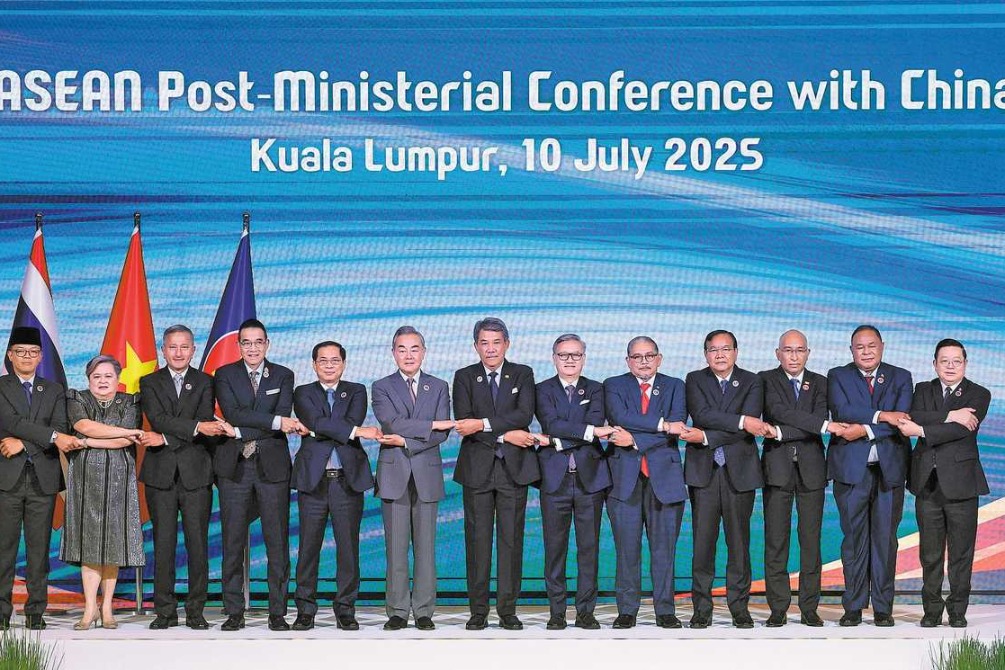Education relations with UK move ahead


Growth path for tertiary initiatives with China holds firm in pandemic
Cooperation between China and the United Kingdom has ensured that joint education programs are holding up well despite the disruptions brought about by the coronavirus pandemic over the past year.
Regarded as a safer and lower-cost approach to obtain an international qualification, transnational educational, or TNE, partnerships have grown in popularity in China in recent years.
Since the establishment of the first Sino-UK TNE program, between Shanghai University of Finance and Economics and the University of Southampton in 2000, 244 active joint programs and 30 joint institutions have been set up by the two countries, according to Beijing-based consultancy Venture Education.
Despite the tightening regulatory environment and challenges in operating TNE partnerships, the Chinese government approved three new Sino-UK joint programs in June 2020, and analysts say the UK is likely to remain one of the strongest partners with China in transnational education.
David Foster, director of business development of the University of Nottingham Ningbo China, believes the growing popularity of such collaboration lies in the fact that the UK and China see education, and higher education in particular, as an area of win-win cooperation. The university became the first Sino-foreign college when it opened in 2004.
"Put simply, the UK side get access to a massive pool of high-quality students as well as attractive policies and research funding," Foster said. "While Chinese institutions benefit from research collaboration and knowledge exchange, Chinese students benefit from instruction and a mode of education that takes them beyond their comfort zone of exam-oriented education and allows them to develop the skills that are needed in the modern world.
"The era of large-scale partnerships, such as the University of Nottingham Ningbo China, might have passed to an extent, but the appetite for smaller-scale joint institutions and joint programs seems to only increase. The quality of UK instruction and research fills an identified gap in Chinese higher education."
Ellen Xu, executive director of UK education at Shanghai-based consultancy BE Education, said another factor that can be attributed to the growth of joint programs is the burden students face in the increasingly competitive College Entrance Examination in China, commonly known as Gaokao.
"Even though the acceptance rate has increased from 58.83 percent in 2000 to 81.13 percent in 2018, the total number of failed students increased from 153 million to 184 million," Xu said. "This means a good number of students might not be able to attend a Chinese university. Therefore, parents would seek different opportunities to help them to be more competitive, such as being educated in a joint course so that they could have a better future."
According to Venture Education's China-UK Transnational Higher Education Partnerships Report, 92 percent of the China-UK TNE programs approved by China's Ministry of Education are at the undergraduate level, with 13 joint programs having started their first year of admissions in September 2020.
Popular subjects
Mechanical engineering and electrical engineering have been the two most popular subjects for collaboration since 2010. While "3+1" (57 percent) continues to be the most common mode of joint undergraduate programs, more programs are employing "4+0"' mode (38 percent), which means students do not spend any time in the UK at all, the report noted.
There are only joint doctorate programs, including for doctor of business administration study at Manchester University and Shanghai Jiao Tong University, as well as for doctor of management study at the University of Stirling and the University of Chinese Academy of Social Sciences.
Thirty joint institutions have been established between China and the UK, with only two having an independent legal entity, including the University of Nottingham Ningbo and Xi'an Jiaotong-Liverpool University, which was founded in 2006.
The report revealed 91 UK Universities and colleges are operating TNE Partnerships with China, of which 73 percent are in England, 17 percent in Scotland, 8 percent in Wales, and 2 percent in Northern Ireland. Some 82 percent of the TNE programs required candidates to take the national entrance exams.
Julian Fisher, senior partner at Venture Education, expects there will still be a continuing demand in China for British education, especially now that parents are becoming more concerned about sending their children to study abroad, especially in the US and Australia.
"Concerns over safety in the post-pandemic (world) will likely push students toward more '4+0' programs or possibly new modes of study that combine an online and offline element," he said.
Education experts say that while such collaboration has become more common, there is an urgency for institutions to improve recognition and trust in qualifications.
"The actual quality of many of the programs is somewhat elusive," Fisher said. "It is essential that there is continual communication, a program-market fit, considered and collaborative planning and a real willingness from both sides to learn.
"Most importantly both sides must be motivated first and foremost by a belief in the best possible education for the students. If politics, money, bureaucracy, pride, a lack of accountability or willful ignorance take precedence then the quality of programs, and trust between all stakeholders, will obviously decrease."
Foster suggested that institutions need to make the effort to put down roots in China and fully engage with their host society on more than a superficial commercial level.
"They need to be engaged at a local government level with outreach programs, then need to fund scholarships for students from disadvantaged areas, and they need to be sure to be equipping their students with the skills they need that will see them flourish in their careers, both at home and abroad," he said. "In the end, the institution will be judged on the quality and success of their graduates."































